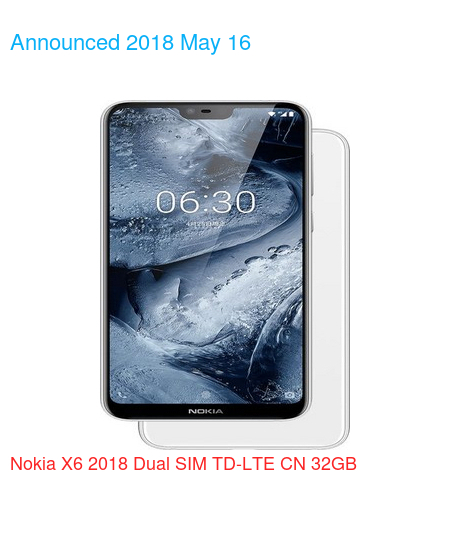| Brand | Nokia |
| Model | X6 2018 Dual SIM TD-LTE CN 32GB |
| Released | 2018 May 21 |
| Announced | 2018 May 16 |
| Hardware Designer | HMD Global |
| Manufacturer | FIH Precision Electronics |
| Codename | HMD DRG |
| OEM ID | TA-1099 |
| General Extras | Haptic touch feedback |
| Device Category | Smartphone |
| Width | 70.98 mm |
| Height | 147.2 mm |
| Depth | 7.99 mm |
| Dimensions | 2.79×5.80×0.31 inches |
| Mass | 152 g |
| Platform | Android |
| Operating System | Google Android 8.1 (Oreo) |
| Software Extras | Voice Command , Navigation software , Face Recognition |
| CPU Clock | 1800 MHz |
| CPU | Qualcomm Snapdragon 636 SDM636, 2017, 64 bit, octa-core, 14 nm, Qualcomm Adreno 509 GPU |
| RAM Type | LPDDR4x SDRAM |
| RAM Capacity (converted) | 4 GiB RAM |
| Non-volatile Memory Interface | Yes |
| Non-volatile Memory Capacity (converted) | 32 GB ROM |
| Display Notch | 1-notch |
| Display Diagonal | 147 mm |
| Resolution | 1080×2280 |
| Horizontal Full Bezel Width | 8.05 mm |
| Display Area Utilization | 80.0% |
| Pixel Density | 436 PPI |
| Display Type | Color IPS TFT LCD display |
| Number of Display Scales | 16.8M |
| Scratch Resistant Screen | Gorilla Glass 3 |
| Graphical Controller | Qualcomm Adreno 509 |
| Dedicated Graphics Memory | 0.25 MiB |
| A/V Out | No |
| Microphone(s) | mono |
| Loudspeaker(s): | mono |
| Audio Output: | 3.5mm |
| Supported Cellular Bands | GSM850 , GSM900 , GSM1800 , GSM1900 , UMTS2100 (B1) , UMTS1900 (B2) , UMTS850 (B5) , UMTS900 (B8) , CDMA800 (BC0) , TD-SCDMA2000 , TD-SCDMA1900 , LTE2100 (B1) , LTE1800 (B3) , LTE850 (B5) , LTE900 (B8) , TD-LTE2000 (B34) , TD-LTE2600 (B38) , TD-LTE1900 (B39) , TD-LTE2300 (B40) , TD-LTE2500 (B41) bands |
| Supported Cellular Data Links | GPRS , EDGE , UMTS , HSUPA , HSUPA 5.8 , HSDPA , HSDPA 7.2 , HSPA+ 21.1 , cdmaOne , CDMA2000 1x , CDMA2000 1xEV-DO , TD-SCDMA , TD-HSDPA , LTE , LTE 100/50 , LTE 150/50 data links |
| SIM Card Slot | Nano-SIM (4FF) |
| Complementary Phone Services | Voice transmission , Voice speaker , Vibrate , Speakerphone , ANC , HD Voice , VoLTE |
| Dual Cellular Network Operation | Dual standby |
| Sec. Supported Cellular Networks: | GSM850 , GSM900 , GSM1800 , GSM1900 |
| Sec. Supported Cellular Data Links: | GPRS , EDGE |
| Sec. SIM Card Slot | Nano-SIM (4FF) |
| Touchscreen Type | Capacitive multi-touch screen |
| Expansion Interfaces | TransFlash , microSD , microSDHC , microSDXC |
| USB | USB 2.0 |
| USB Services | USB charging , USB fast charging , USB Host , USB OTG 1.3 , USB PD |
| USB Connector | USB C reversible |
| Bluetooth | Bluetooth 5.0 |
| Wireless LAN | 802.11a , 802.11b , 802.11g , 802.11n |
| Wireless Services | Wi-Fi Direct , Wi-Fi Tethering , Wi-Fi Calling |
| FM Radio Receiver | FM radio (76-108 MHz) with RDS |
| Complementary Satellite Services | Simultaneous GPS , A-GPS , Geotagging , QuickGPS |
| Supported GLONASS protocol(s) | L1OF |
| Supported BeiDou system (BDS) | B1I BeiDou receiver |
| Camera Placement | Rear |
| Camera Image Sensor | CMOS |
| Image Sensor Pixel Size | 1.00 micrometer |
| Number of effective pixels | 15.9 MP camera |
| Aperture (W) | f/2.00 |
| Zoom | 1.0 x optical zoom |
| Focus | PD AF |
| Video Recording | 3840×2160 pixel |
| Flash | dual LED |
| Camera Extra Functions | EIS , HDR photo , Red-eye reduction , Slow motion video , Burst mode , Touch focus , Macro mode , Panorama Photo , Face detection , Face tagging , Intelligent scene detection |
| Aux. Camera Image Sensor | Mono CMOS |
| Aux. Cam. Image Sensor Pixel Size | 1.12 micrometer |
| Aux. Camera Number of Pixels | 4.9 MP aux. cam |
| Aux. Camera Aperture (W) | f/2.40 |
| Aux. 2 Camera Image Sensor | No |
| Aux. 3 Camera Image Sensor | No |
| Aux. 4 Camera Image Sensor | No |
| Secondary Camera Placement | Front |
| Secondary Camera Sensor | CMOS |
| Secondary Camera Number of pixels | 15.9 MP sec. cam |
| Secondary Aperture (W) | f/2.00 |
| Secondary Video Recording | 1920×1080 pixel |
| Secondary Camera Extra Functions | HDR photo , Burst mode , Panorama Photo , Face detection , Face tagging , Smile detection , Face retouch , Intelligent scene detection |
| Sec. Aux. Cam. Image Sensor | No |
| Built-in compass | Yes |
| Built-in accelerometer | Yes |
| Built-in gyroscope | Yes |
| Additional sensors | FP sensor , L sensor , P sensor |
| Protection from solid materials | Yes |
| Protection from liquids | Yes |
| Battery | Li-ion |
| Nominal Battery Capacity | 3060 mAh battery |
| Market Countries | China |
| Market Regions | Asia |
| Mobile Operator | China Mobile Limited China Telecom Corporation Limited China Unicom Netcom Limited |
| Added | 2024-06-21 |
Specifications data description of this 📱Nokia X6 2018 Dual SIM TD-LTE CN 32GB📱
Title: Specification of the Device: A Comprehensive Overview
Introduction
————
In today’s fast-paced world, technology has become an essential part of our daily lives. With a myriad of devices and gadgets available in the market, it can be overwhelming to choose the right one that suits our needs. In this blog post, we will discuss the specification of a device, providing an in-depth look into its features and functionalities. So, buckle up and get ready to explore the world of technology!
Lineup
——
When it comes to devices, there are various types available, each with its unique specifications. Some of the most common types of devices include smartphones, laptops, tablets, smartwatches, and smart TVs. Each type has its specifications, which cater to the needs of the users. For instance, a smartphone may have different specifications compared to a laptop. It is essential to choose the right device that meets your requirements.
Design
——
The design of a device is an essential factor that can influence a user’s decision. A well-designed device not only looks good but also enhances the user experience. It includes factors such as the size, weight, shape, color, and materials used in the device. A sleek and lightweight device is more desirable than a bulky and heavy one. Moreover, the device’s build quality also plays a significant role in the design aspect.
Specifications
————–
Now that we have discussed the design let’s dive into the specifications of the device. Here are some of the critical specifications that you need to consider when choosing a device:
### 🌐 Network
The network of a device determines the speed and quality of the internet connection. A device with a fast and stable network is essential for a smooth and seamless user experience. Look for a device with the latest network technology, such as 5G, for a faster and better internet connection.
### 📅 LAUNCH
The launch of a device affects its performance and features. A newer device will have the latest software and hardware upgrades compared to an older device. Choose a device that has been launched recently for optimal performance and functionality.
### 🏋️ BODY
The body of a device includes factors such as size, weight, and build quality. Look for a device that has a comfortable grip, lightweight, and made of durable materials.
### 🌈 DISPLAY
The display of a device determines the quality of the visuals. Look for a device with a high-resolution display and a high refresh rate for a better visual experience.
### 🤖 OS
The operating system of a device determines the functionality and compatibility of the device. Look for a device with the latest operating system for optimal performance and compatibility.
### 🛠️, 🚀 Chipset, 🔧, 💪 CPU, 🖥️, 🎮 GPU, 💻
The chipset, CPU, and GPU are the key components that determine the performance of a device. Look for a device with a powerful chipset, CPU, and GPU for optimal performance and functionality.
### 🧠 MEMORY 🗂️
The memory of a device determines the speed and performance of the device. Look for a device with a high memory capacity for faster and smoother performance.
### 📷 CAMERA 🎥
The camera of a device determines the quality of the photos and videos. Look for a device with a high-resolution camera and advanced features such as optical image stabilization and night mode for better photo and video quality.
### 🔈 SOUND 🎵
The sound of a device determines the quality of the audio. Look for a device with high-quality speakers and sound technology for a better audio experience.
### 📡 COMMS 📶
The communications of a device determine the connectivity and compatibility of the device. Look for a device with advanced communication technology such as Bluetooth, Wi-Fi, and NFC for better connectivity and compatibility.
### 💡 FEATURES 🎁
The features of a device determine the functionality and usability of the device. Look for a device with advanced features such as biometric authentication, water and dust resistance, and wireless charging for better functionality and usability.
### 🔋 BATTERY🔌
The battery of a device determines the usage time and charging speed of the device. Look for a device with a high-capacity battery and fast-charging technology for better usage time and charging speed.
Conclusion
———-
In conclusion, choosing the right device with the right specifications is essential for a smooth and seamless user experience. The device’s specification includes the network, design, display, operating system, chipset, CPU, GPU, memory, camera, sound, communications, features, and battery. When choosing a device, consider these specifications and choose the one that meets your needs and requirements. Don’t forget to leave a comment and let us know your thoughts!














